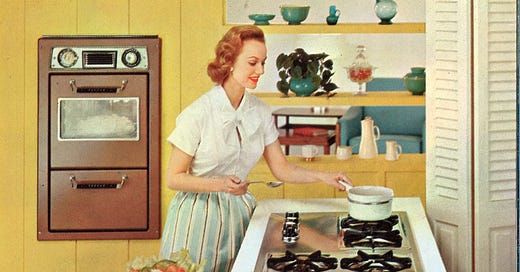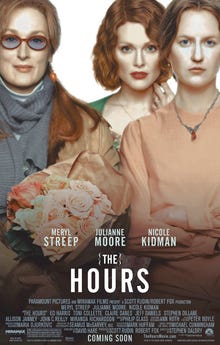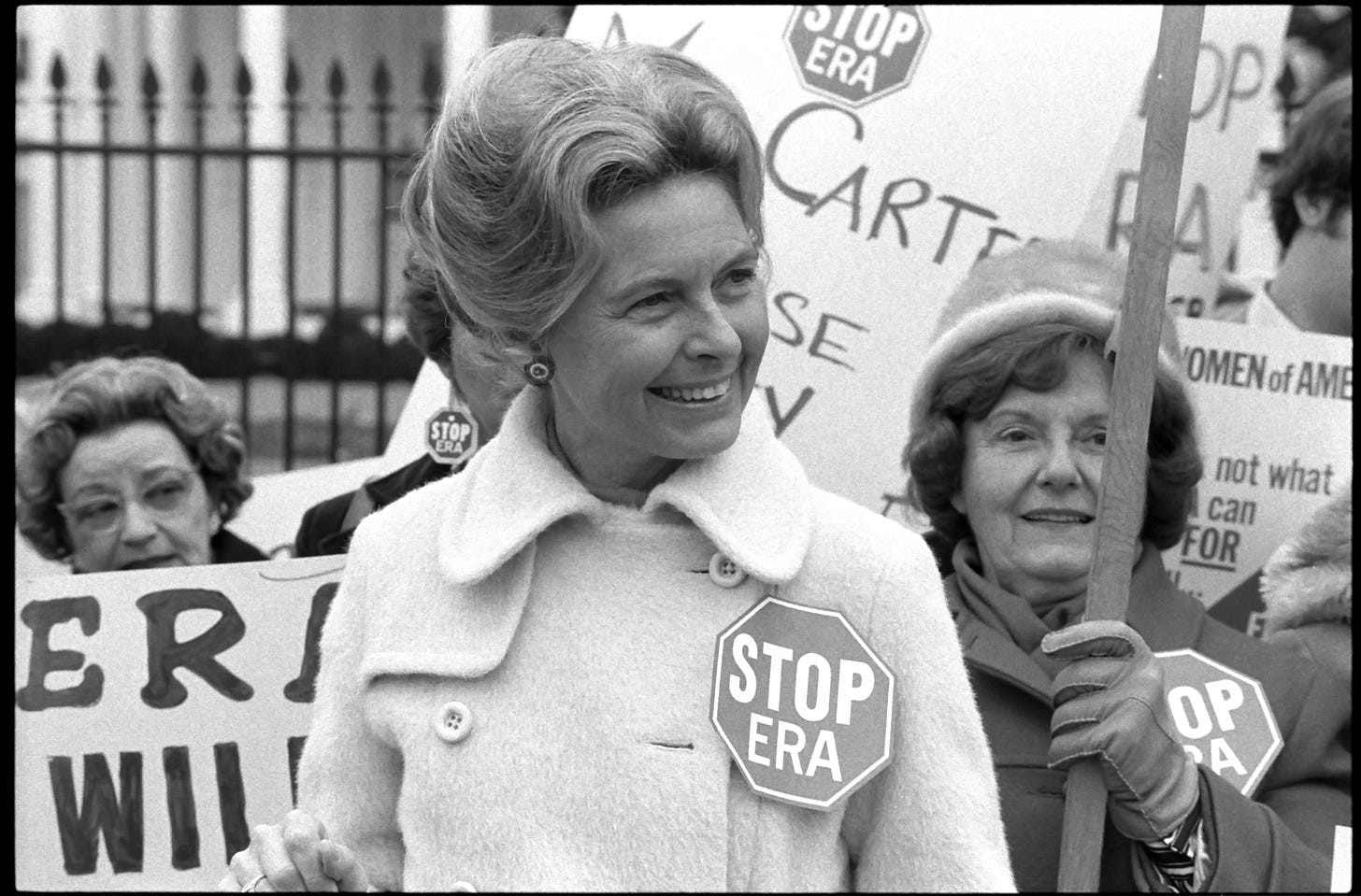Welcome to A Narrative of their Own, where I discuss the work of 20th century women writers and their relevance to contemporary culture.
If you value the work that goes into writing this newsletter, consider becoming a paid subscriber today. Your support makes this work possible.
A recent re-watching of The Hours by Michael Cunningham reminded me of the wonderful characterisation of my favourite section of the book: that of Laura Brown.
Laura Brown (played by the fabulous Julianne Moore) is a married housewife in 1950s US suburbia. We understand from Cunningham’s fantastic novel (and the film adheres very closely to the original book) that Laura is a keen reader - she is reading Mrs Dalloway - and really only ever wanted to sit and read books and live a quiet, unassuming life. After the end of WWII, however, she, like many of her contemporaries, found herself marrying a returning veteran and settling into a ‘nice’ neighbourhood in suburbia. She has the house, the car, and the husband off to his 9-5 job every morning.
A mother of one young son and another baby on the way, we see Laura as she descends into a quiet desperation of needing to escape the life she has found herself in. She contemplates suicide, but due to the growing life inside of her, she backs out at the last minute.
Later in the novel, we discover that Laura could not continue with her life of quiet desperation and eventually committed the ultimate betrayal for a woman: she abandoned her family to live a life of quiet solitude, moving to Canada to become a librarian.
What I love about Cunningham’s choice for Laura Brown is that she doesn’t succumb to the trope of punishment often doled out to women who transgress in earlier novels; in fact, she outlives the whole of her family, something she acknowledges at the end of the book/film to be the ultimate unforgivable act for a woman.
I completed the close read-along of The House of Mirth run by Haley at Closely Reading this week, and so these issues surrounding ambiguous endings in female narratives were on my mind. As discussed in the fantastic comments thread, connections have been made between Lily Bart of Mirth and Edna Pontellier of The Awakening by many critics in the endings of both books, and I wrote an essay on this in conjunction with a review of Emma Cline’s The Guest a few months ago. Women in novels have long been ‘punished’ for their transgressions, so Cunningham’s choices within his novel showed a welcome alternative for the character of Laura Brown.
I know that The Hours is not a novel written by a woman, as is usual within these pages, however the character of Laura Brown is someone who stuck with me long after I finished reading (and watching). Moore plays her desperate need for escape with precision: she longs for a quiet room in which to read; in which to be herself. Woolf’s ‘Room of One’s Own’ is an ever-present ghost at her perfectly arranged dinner table, as we witness her less-than perfect attempts at creating a birthday cake for her husband and her longing to kiss her female neighbour, played by Toni Collette.
This was all on my mind as I stumbled across an article on a trend which took off on social media several years ago known as “The tradwife”. If, like me, you are late to this particular party, “Tradwife” (short for ‘Traditional Housewife’) is a so-called subculture based on advocating for traditional values within marriage, in particular for wives and mothers, and couples practising this particular brand of marriage look to return to more traditional gender roles.1
Tradwives are women who respect a return to femininity and caring for their husbands and children, valuing taking care of their homes rather than working outside of the home for a salary. These are not necessarily subservient to their male partners, but simply choose to enact a role more traditionally seen in the lives of the 1950s housewife. They see homemaking as their calling, rather than building a career outside of the home.
The irony to this, however, is that many of these so-called tradwives have built successful online social media businesses, with hundreds of thousands of followers tuning in to watch their vlogs of housewifely perfection.
This brought to mind the series Mrs America featuring Cate Blanchett as Phyllis Schlafly, the American attorney and conservative activist who, as an anti-feminist spokesperson, attempted to block the Equal Rights Amendment in the 1970s. She cited concerns around the loss of privileges to married women in cases such as divorce, widowhood and military service.
What reminded me of Schlafly and the more prominent tradwives was that she ran an anti-feminist campaign, convincing other housewives to join her in their crusade to block what she saw as a bill that would take away their married rights. Some of their lobbying tactics involved delivering homemade bread to members of congress. She also studied for a law degree in the late 1970s, and although she often described herself as a ‘homemaker’ and ‘volunteer’, and cited ‘mother’ as her primary occupation, (she had six children), many of her critics saw it as ironic that she pursued an active career whilst lobbying against feminist causes and working women.
The tradwife movement emerged on social media around six years ago, initially gaining popularity on Reddit, through an anti-feminist thread called 'Red Pill'. Women identifying themselves as tradwives then began posting on the other mainstream social media platforms, primarily Instagram. Some media critics suggest that popularity in their follower numbers exploded during the pandemic, when people’s isolation led to engagement in more ‘radical’ lifestyle accounts.
Seen as initially hailing from the US, the movement has seen popularity in the UK, though has not been so popular in mainland Europe.
Though there are divisions within the tradwife movement, there are some connections with more anti-feminist, conservative ideologies, as well as some extremes falling within the white nationalist and supremacist ideologies. Religion and a return to gender definitions drawn from the Bible is also often quoted by some of the exponents of the movement.
Some critics have pointed out a racial and class aspect to the tradwife movement, as these women are generally white and, to have the choice to live on one salary in such a precarious economic reality, require a male partner with a sustaining single salary. As stated above, however, though the women practising the tradwife way of life espouse a return to traditional values of the stay at home wife and mother, they often make money from their social media accounts, raising the question of whether they actually walk the walk of the traditional homemaker role.
In accordance with this, some critics have stated that the role of housewife is nothing new: what is new is that these women choose to talk about how great a return to this traditional lifestyle is on social media. The aesthetic is all a part of this; these women can often be seen posing in 1950s inspired trends, in feminine dresses and with hairdos straight off of the set of The Donna Reed Show. A leading proponent of the movement who has also made a business out of the aesthetic is Alena Kate Pettitt, who runs the Darling Academy, a newsletter and YouTube channel celebrating British etiquette.
But many of the tradwives are keen to point out that they are the ‘true feminists’ in that they are exercising their choice not to work. And it is on this one point that I find it difficult to argue: feminism was and is a movement designed to promote the equality of all and for women to exercise their own right to choice over their lives, in all aspects. If that means that a wife and mother chooses to spend time at home raising her family and doing the lion’s share of the housework, does that make her anti-feminist?
I think the era of social media and the promotion of this lifestyle makes it come under more intense scrutiny. Pettitt’s tweeting of “husbands must always come first if you want a happy marriage”, for example, does not help the cause. Also, as many have further pointed out and I touched on above, the fact of ‘choosing’ to become a tradwife depends on marriage to a partner who can provide enough to sustain a family comfortably.
Some have debated whether this isn’t just a case of a group of women who, whilst feeling insecure about their choices, have chosen to portray themselves as the oppressed spokeswomen of an alternative subculture. But this isn’t actually about fighting the system: this is about women fighting against their own insecurities about their lives. As Hadley Freeman points out in the Guardian feature above, for the British tradwives, their MO appears to be about dressing up in Cath Kidston florals and submitting to their husband’s choice of vacation, whilst in the US, some of the tradwife content appears to side with the alt-right movement.
British tradwives are keen to separate from this, including Pettitt, who informed the BBC that she didn’t realise any of that (whilst ironically seated beneath a union jack bunting and stating the confusion that exists over the ‘identity’ of the UK). Huh.
As with all these so-called ‘subversive’ social media trends, I think this one might be best taken with a pinch of salt.
Preferably served over a delicious meal prepared in your best kitten heels and wearing a feminine-cut dress.*
*That last sentence was intended as a joke, just in case it wasn’t patently obvious 🙂
This newsletter is a labour of love for researching and spreading the word about the fascinating legacy of women’s writing. If you have the means and the wish to support me in this, you can: read, share, comment, support my research, or upgrade to a paid subscription from as little as £2 per month!
Thank you for your support!







Thanks for taking some time to call out the tradwives! This trend bothers me to no end. It’s becoming particularly mainstreamed in the US alongside the Republican Party and the Republicans are making a point of centering this aspect of their culture with the upcoming election this fall. They know they are in trouble with women because they have absolutely decimated women’s rights and so they’re trying to reclaim feminism as this traditional housewife thing and it’s just 🤮. I too am choosing to stay mostly at home with my kids but what is important time is that I get to make that choice. And it’s been harrowing to make that choice because I don’t want to be seen as a tradwife 😂
I read this when you first posted and realized I only read it in the email. But anyway, I wanted to say that I think you did a fantastic job with this piece. I honestly think you nailed it with this. The Red Pill society or whatever scares me. They're very intense, and only growing more intense. Honestly, I just worry for these women. There's so much to say on this topic! I want to say, "you do you" to people, but it's just not that simple.